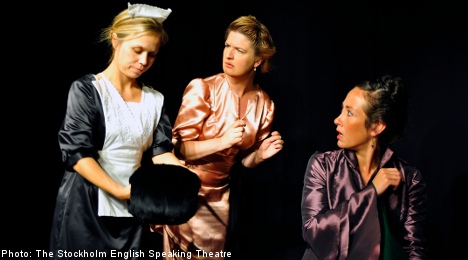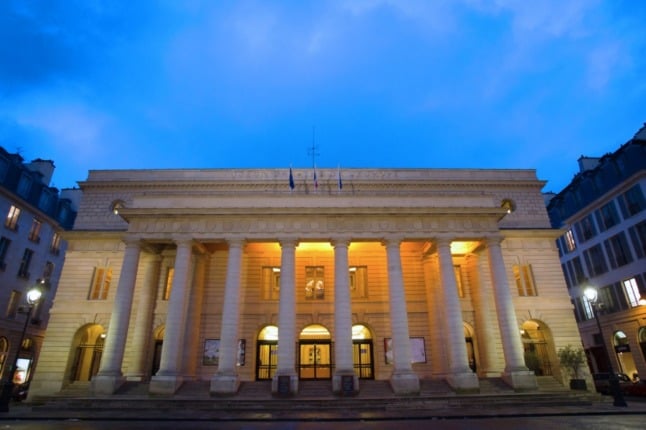Anglophile theatre buffs based in Stockholm may want to keep an evening or two free over the coming fortnight to catch one of eight performances of playwright David Mamet’s Victorian comedy of manners Boston Marriage.
The show is being staged by the Stockholm English Speaking Theatre (SEST) and offers a rare opportunity to enjoy an evening of English-language theatre in the Swedish capital.
The Pulitzer Prize-winning Mamet, also honored with nominations for Tony and Oscar awards, has written several books, as well as the screenplays for Hollywood films such as Wag the Dog.
However, he is perhaps most famous for his work in theatre, having written among others the plays Oleanna, Speed-the-Plow and Glengarry Glen Ross, all of which received critical acclaim.
Kristina Leon, founding member of SEST, is also one of the actresses performing in Boston Marriage. She comments that, for performers and audience alike, one of the main attractions of a Mamet play lies in the singular dialogue, known for its realistic style, in which characters more often than not end up finishing each other’s sentences and cutting one another off.
“It’s easy to transfer his plays to the stage. He stresses words the way they’re meant to be said, he puts in little pauses. All you need to do is read it the way it’s written, and you get it right,” Leon tells The Local.
Mamet’s way of writing dialogue is so striking it has come to be known as “Mamet speak”.
Boston Marriage explores the relationship between Anna and Claire, two unmarried women living together in the beginning of the 20th century. The audience is also introduced to their maid Catherine, fresh off the boat from Scotland and struggling to find her place in this unusual household.
The play draws its name from the ladies’ unusual living arrangement: “Boston marriage” is an archaic term used to describe two women living together in a lesbian relationship, independent of financial support from a man.
Kristina Leon summarises the play as dripping with metaphors and wordplay, and also highlights its language: early 20th century discourse and modern language have been melded together, creating an entertaining mix.
“You’ve got two women living together, who’ve been living together for a long time, and are just constantly continuing each other’s sentences and cutting each other off,” she says.
“It’s quick and snappy, really comical.”
The witty play was once described by Australian theatre critic Liza Dezfouli as “a viciously funny comedy of manners with the earthy vulgarity typical of Mamet’s writing”, but even so, Kristina Leon points out that it is not wholly without darker undertones.
“I was first attracted by the comedy and humor in the play,” Leon says.
“But it is a story of women who are lesbian at the turn of the century, which was obviously not easy.”
Boston Marriage provides an interesting insight into life for women of the time, demonstrating their difficulties with a comedic twist.
The play was first performed in 1999 by American Repertory Theatre, a production directed by the playwright himself. Since then Boston Marriage has been well received by audiences worldwide, having played in such diverse locations as London, Melbourne, New York, Dublin and Lima.
When curtains go up in the Playhouse theatre on May 20th, Kristina Leon hopes to see a mix of native speakers and Swedes in the crowd, but also welcomes students studying English, pointing out the educational possibilities.
“Going to the theatre is a fantastic way to learn the language. It’s not like going to the cinema, you’ve got no subtitles there,” she says.
SEST was founded in 2010 by Samuele Caldognetto, Kristina Leon and Ingela Lundh. Caldognetto will be directing Boston Marriage, while Leon and Lundh play the main parts, accompanied by actress Helena Lewin.
Boston Marriage is SEST’s second production. Last September saw the company’s first effort in 4:48 Psychosis, by dramatist Sarah Kane.
“Our last play, 4:48 Psychosis, was very dark. Now we’re aiming for something lighter, and want to reach out to a broader audience,” Leon says.
“What we noticed with our last production was that people were craving theatre in English. It makes a real difference to see plays performed in their original language. So much is just lost in translation otherwise,” she points out.
David Mamet’s Boston Marriage will be performed in English by The Stockholm English Speaking Theatre (SEST) at Playhouse, on Sibyllegatan 29. Östermalmstorg is the nearest subway stop. Samuele Caldognetto is director, and Kristina Leon, Helena Lewin and Ingela Lundh are acting. The play begins at 7pm on May 20th-23rd, and May 26-29th. Tickets are available through www.tickster.com or by emailing [email protected], and cost 200 kronor (seniors, unemployed and students pay 150 kronor, up to 20 years pay 100 kronor).
By Clara Guibourg



 Please whitelist us to continue reading.
Please whitelist us to continue reading.
Member comments